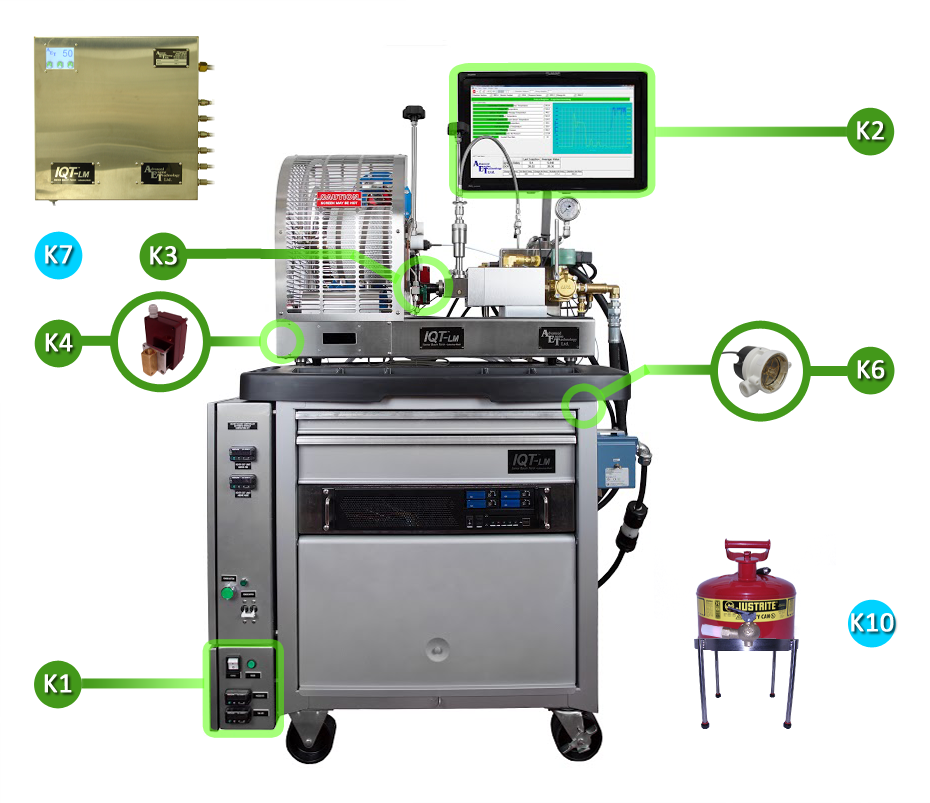Prepare to revolutionize your approach to fuel testing with the IQT system, a true pioneer in the realm of Constant Volume Combustion Chamber (CVCC) instruments. Having dominated the industry since its debut in 1998, IQT has not just set the standard; it is the standard. As the trusted referee test method in EN 15940, governing paraffinic fuels throughout Europe, the IQT system is synonymous with reliability, precision, and cost-efficiency. With its minimal sample size, reduced combustion air requirements, and budget-friendly reference materials, it stands as the ultimate choice for those in the field. Whether you are engaged in fuel blending or conducting groundbreaking research, the IQT system’s unwavering precision and accuracy have got you covered. With over 200 installations worldwide and some boasting over 100,000 test runs, IQT’s reputation as a dependable solution speaks volumes.
Unveiling the IQT TALM Precision Package: Elevate Your Fuel Testing
Take your fuel testing to the next level with the IQT TALM Precision Package. This package goes beyond the standard LM system, incorporating eight upgrade kits to ensure that automation, precision, and user-friendliness reach their peak. If you’re seeking an all-encompassing solution, the TALM Precision Package bundles five primary TALM kits designed to enhance precision and ease of use.
TALM-K1: Elevating Control Cabinet
This electronic interface for other automated components is essential, particularly for kits K3 to K6 and K10.
TALM-K2: IQT System and Control Software
The IQT TALM software offers an advanced test monitoring system with exceptional visibility, accessible from any corner of your lab. It streamlines the calibration process through automated, unattended mode testing, thereby boosting productivity and convenience.
TALM-K3: Nozzle Tip Temperature Control
Enhance IQT precision and eliminate the need for manual coolant flow adjustments with this kit (requires TALM K1 and K2 kits).
TALM-K4: Combustion Chamber Tail Temperature Control
Experience elevated IQT precision by eliminating the requirement for manual coolant flow adjustments in the combustion chamber tail (requires TALM-K1 and K2 kits).
TALM-K6: Electronic Coolant Flow Indicator
Bid farewell to the days of manual coolant flow checks at the beginning and end of an operating period. Kit K6 provides automated digital coolant flow indication within the IQT™ System Software (ISS) (requires TALM-K1 and K2 kits).
Discover More TALM Upgrade Kits
TALM-K7: Electronic Pressure Regulator Panel (optional)
Take automation and precision to a higher level with this panel, which takes charge of gas stream pressures and monitors cylinder gas levels. It eliminates the need for manual gas pressure adjustments, enhances precision, and provides warnings for low gas levels.
TALM-K8: Improved Heater Monitoring Tool (coming soon)
TALM-K9: Self-Sealing Fuel Reservoirs with Filling Cleaning Station
Enhance productivity, safety, and fuel handling with self-sealing reservoirs that can be remotely filled. This enables you to prepare samples in advance for quicker testing and increased efficiency.
TALM-K10: Waste Fuel Container
Automate the monitoring of fuel levels in the waste fuel container to prevent spills. Receive operator alerts through the TALM-K2 graphical user interface (requires TALM-K1 and K2 kits).
Key Features That Set IQT Apart
ASTM D6890-18 extends the testing range (31.5 to 75.1 DCN) with enhanced precision.
Sensitive to cetane improver additives and minor fuel quality variations.
Measures high levels of cetane improver (3000 ppm+ 2EHN) without negative carryover effects.
Ideal for testing highly paraffinic fuels from synthesis or hydro-treatment.
Automated, quiet operation for ease of use.
Short test time (under 20 minutes) ensures high productivity.
Small sample size (less than 100 mL) reduces resource consumption.
Rugged system with low operating and maintenance costs.
Easy maintenance access.
Proven safety track record over the years.
Trusted for testing B100 and various biodiesel fuels from diverse sources.
FAQs about the IQT Totally Automated Laboratory Model
What is the IQT system, and why is it significant in fuel testing?
The IQT system is a cutting-edge CVCC (Constant Volume Combustion Chamber) instrument that has been at the forefront of fuel testing since 1998. It’s significant because it serves as the referee test method in EN 15940, governing paraffinic fuels in Europe, making it a proven, reliable, and precise instrument with low operating costs.
What are the key advantages of the IQT system?
The IQT system boasts advantages such as a small sample size, reduced specification combustion air, and cost-effective reference materials. It offers exceptional precision, making it a valuable tool for fuel blending and research purposes. With over 200 installations worldwide and a trusted track record, it’s a symbol of reliability.
What is the IQT TALM Precision Package, and how does it enhance the standard IQT system?
The IQT TALM Precision Package is a set of upgrade kits designed to elevate the automation, precision, and user-friendliness of the standard IQT system. It includes kits like TALM-K1 (System Control Cabinet), TALM-K2 (IQT System and Control Software), and more, all aimed at improving the overall testing experience.
Can I customize my IQT TALM Precision Package with specific upgrade kits?
Absolutely! The TALM Precision Package offers flexibility with eight available upgrade kits. You can choose the kits that best suit your needs, and if you prefer a comprehensive solution, you can opt for the TALM Precision Package, which bundles five primary TALM kits.
How does the TALM-K7 Electronic Pressure Regulator Panel benefit IQT operators?
The TALM-K7 panel enhances automation and precision by controlling all three gas stream pressures and monitoring gas levels in cylinders. It eliminates the need for manual gas pressure adjustments, ensures stable gas pressures, and alerts operators when gas cylinders are nearly empty to prevent test interruptions.
What are the key features that set the IQT system apart from other fuel testing instruments?
The IQT system stands out with its extended testing range (31.5 to 75.1 DCN), sensitivity to cetane improver additives, ability to measure high levels of cetane improver without carryover effects, suitability for testing highly paraffinic fuels, automation, quiet operation, short test times, small sample size, low operating costs, and a proven safety track record.
Can the IQT system test biodiesel fuels, and if so, from what sources?
Yes, the IQT system has a proven testing capability for B100 and various biodiesel fuels from different sources. It is versatile and adaptable for a wide range of fuel types.
How can I learn more about the IQT system and its capabilities for my specific needs?
To explore the IQT system’s capabilities and discuss how it can meet your specific requirements, please contact our team of experts who will be happy to provide you with detailed information and guidance.




